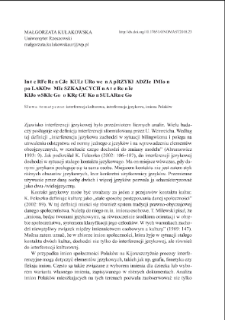
Obiekt
Tytuł: Interferencje kulturowe na przykładzie imion Polaków mieszkających na terenieKijowskiego Okręgu Konsularnego
Wydawca:
Instytut Języka Polskiego Polskiej Akademii Nauk
Miejsce wydania:
Opis:
Typ obiektu:
Abstrakt:
This paper describes the phenomenon of cultural and language interference in the names of Poles livingin the Kiev Consular District. The names were selected out of 673 granted requests for the Card of thePole. According to the regulations, the names specified in the Card of the Pole should be in conformitywith the transcript in the applicant’s identity document. The Act on the Pole’s Card (Ustawa o KarciePolaka) allows Polish language transcription of the holder’s name. An analysis of the names from theapplications for issue of the Card of the Pole shows that some people decided to keep to the Latin transcriptionof their name entered in their Ukrainian passport. The said forms are not always compliant withthe Polish spelling. Lack of forms following the Polish spelling (like Yurii, Iuliya) is a manifestation oflanguage interference, namely implementation of foreign language elements to the mother tongue of bilingualpersons. Forms of that type represent only a slight percentage of the researched names. Culturalinterference, that is, penetration of the domestic culture by elements of other culture has a much biggercoverage. A manifestation of cultural interference in selection of names is when an Eastern Slavonicversion of a name is left when it is possible to use its Polish equivalent (for instance choosing the Polishtranscription of the name Yuriii as Jurij, instead of Polish Jerzy). Cultural interference occurs also whenchildren are given names that are not included in the Polish name canon. The reasons for interferenceare: poor knowledge of Polish that is now often learnt from scratch; a sample application for the Cardof the Pole (applicable by September 2016) where it was not clearly stated that a Polish version of thename may be entered; or a long-term influence of the totalitarian system, when — in certain periods —disclosure of Polish origin would entail repressions. Despite of political changes, parents still prefer togive their children names that are present in both onymic systems.
Strona pocz.:
Strona końc.:
Szczegółowy typ zasobu:
Format:
Identyfikator zasobu:
Język:
Prawa:
Prawa zastrzeżone - dostęp nieograniczony
Dostęp:
Kolekcje, do których przypisany jest obiekt:
- Instytut Języka Polskiego PAN > Dziedziny nauki
- Instytut Języka Polskiego PAN > Dziedziny nauki > Nauki humanistyczne
- Instytut Języka Polskiego PAN > Dziedziny nauki > Nauki humanistyczne > Językoznawstwo
- Instytut Języka Polskiego PAN > Dziedziny nauki > Nauki humanistyczne > Językoznawstwo > Onomastyka
- Instytut Języka Polskiego PAN > Książki
Data ostatniej modyfikacji:
2 paź 2020
Data dodania obiektu:
20 sty 2020
Liczba pobrań / odtworzeń:
581
Wszystkie dostępne wersje tego obiektu:
https://rcin.org.pl/ijp/publication/133893

 INSTYTUT ARCHEOLOGII I ETNOLOGII POLSKIEJ AKADEMII NAUK
INSTYTUT ARCHEOLOGII I ETNOLOGII POLSKIEJ AKADEMII NAUK
 INSTYTUT BADAŃ LITERACKICH POLSKIEJ AKADEMII NAUK
INSTYTUT BADAŃ LITERACKICH POLSKIEJ AKADEMII NAUK
 INSTYTUT BADAWCZY LEŚNICTWA
INSTYTUT BADAWCZY LEŚNICTWA
 INSTYTUT BIOLOGII DOŚWIADCZALNEJ IM. MARCELEGO NENCKIEGO POLSKIEJ AKADEMII NAUK
INSTYTUT BIOLOGII DOŚWIADCZALNEJ IM. MARCELEGO NENCKIEGO POLSKIEJ AKADEMII NAUK
 INSTYTUT BIOLOGII SSAKÓW POLSKIEJ AKADEMII NAUK
INSTYTUT BIOLOGII SSAKÓW POLSKIEJ AKADEMII NAUK
 INSTYTUT CHEMII FIZYCZNEJ PAN
INSTYTUT CHEMII FIZYCZNEJ PAN
 INSTYTUT CHEMII ORGANICZNEJ PAN
INSTYTUT CHEMII ORGANICZNEJ PAN
 INSTYTUT FILOZOFII I SOCJOLOGII PAN
INSTYTUT FILOZOFII I SOCJOLOGII PAN
 INSTYTUT GEOGRAFII I PRZESTRZENNEGO ZAGOSPODAROWANIA PAN
INSTYTUT GEOGRAFII I PRZESTRZENNEGO ZAGOSPODAROWANIA PAN
 INSTYTUT HISTORII im. TADEUSZA MANTEUFFLA POLSKIEJ AKADEMII NAUK
INSTYTUT HISTORII im. TADEUSZA MANTEUFFLA POLSKIEJ AKADEMII NAUK
 INSTYTUT JĘZYKA POLSKIEGO POLSKIEJ AKADEMII NAUK
INSTYTUT JĘZYKA POLSKIEGO POLSKIEJ AKADEMII NAUK
 INSTYTUT MATEMATYCZNY PAN
INSTYTUT MATEMATYCZNY PAN
 INSTYTUT MEDYCYNY DOŚWIADCZALNEJ I KLINICZNEJ IM.MIROSŁAWA MOSSAKOWSKIEGO POLSKIEJ AKADEMII NAUK
INSTYTUT MEDYCYNY DOŚWIADCZALNEJ I KLINICZNEJ IM.MIROSŁAWA MOSSAKOWSKIEGO POLSKIEJ AKADEMII NAUK
 INSTYTUT PODSTAWOWYCH PROBLEMÓW TECHNIKI PAN
INSTYTUT PODSTAWOWYCH PROBLEMÓW TECHNIKI PAN
 INSTYTUT SLAWISTYKI PAN
INSTYTUT SLAWISTYKI PAN
 SIEĆ BADAWCZA ŁUKASIEWICZ - INSTYTUT TECHNOLOGII MATERIAŁÓW ELEKTRONICZNYCH
SIEĆ BADAWCZA ŁUKASIEWICZ - INSTYTUT TECHNOLOGII MATERIAŁÓW ELEKTRONICZNYCH
 MUZEUM I INSTYTUT ZOOLOGII POLSKIEJ AKADEMII NAUK
MUZEUM I INSTYTUT ZOOLOGII POLSKIEJ AKADEMII NAUK
 INSTYTUT BADAŃ SYSTEMOWYCH PAN
INSTYTUT BADAŃ SYSTEMOWYCH PAN
 INSTYTUT BOTANIKI IM. WŁADYSŁAWA SZAFERA POLSKIEJ AKADEMII NAUK
INSTYTUT BOTANIKI IM. WŁADYSŁAWA SZAFERA POLSKIEJ AKADEMII NAUK
































